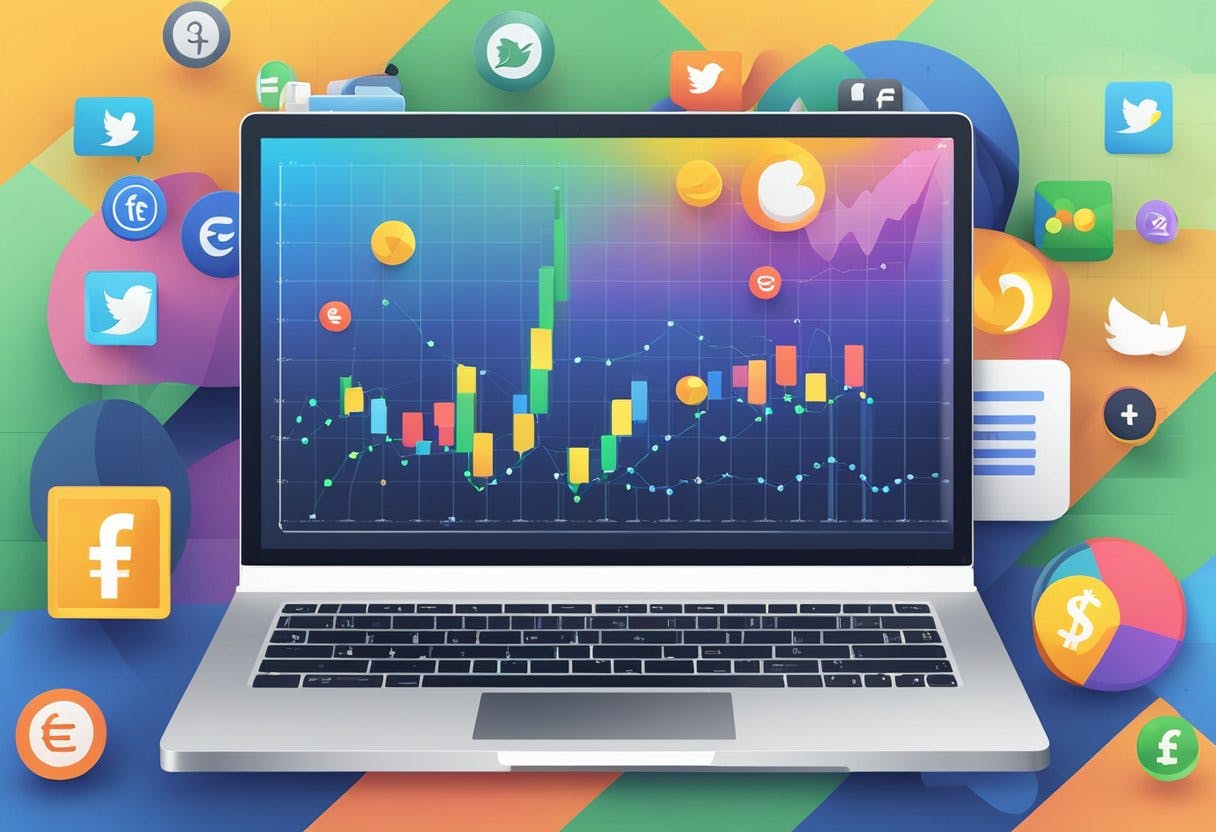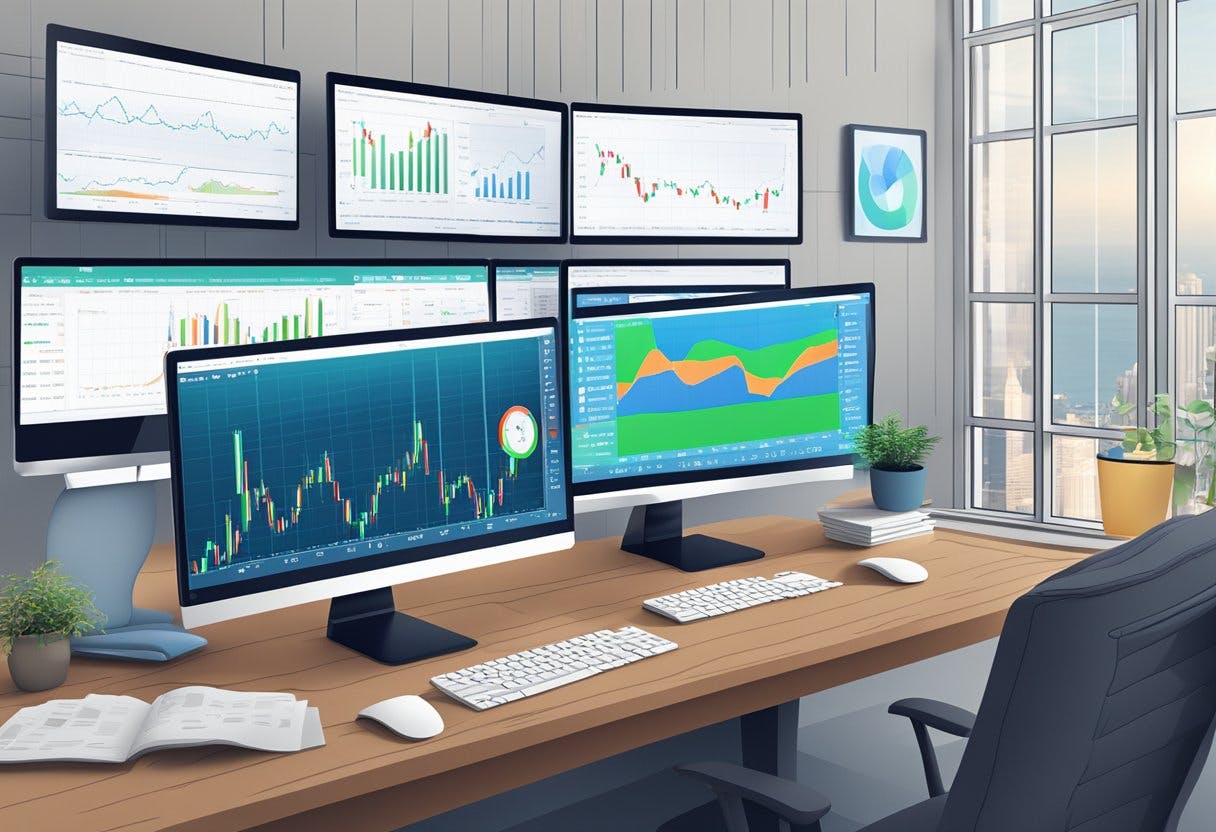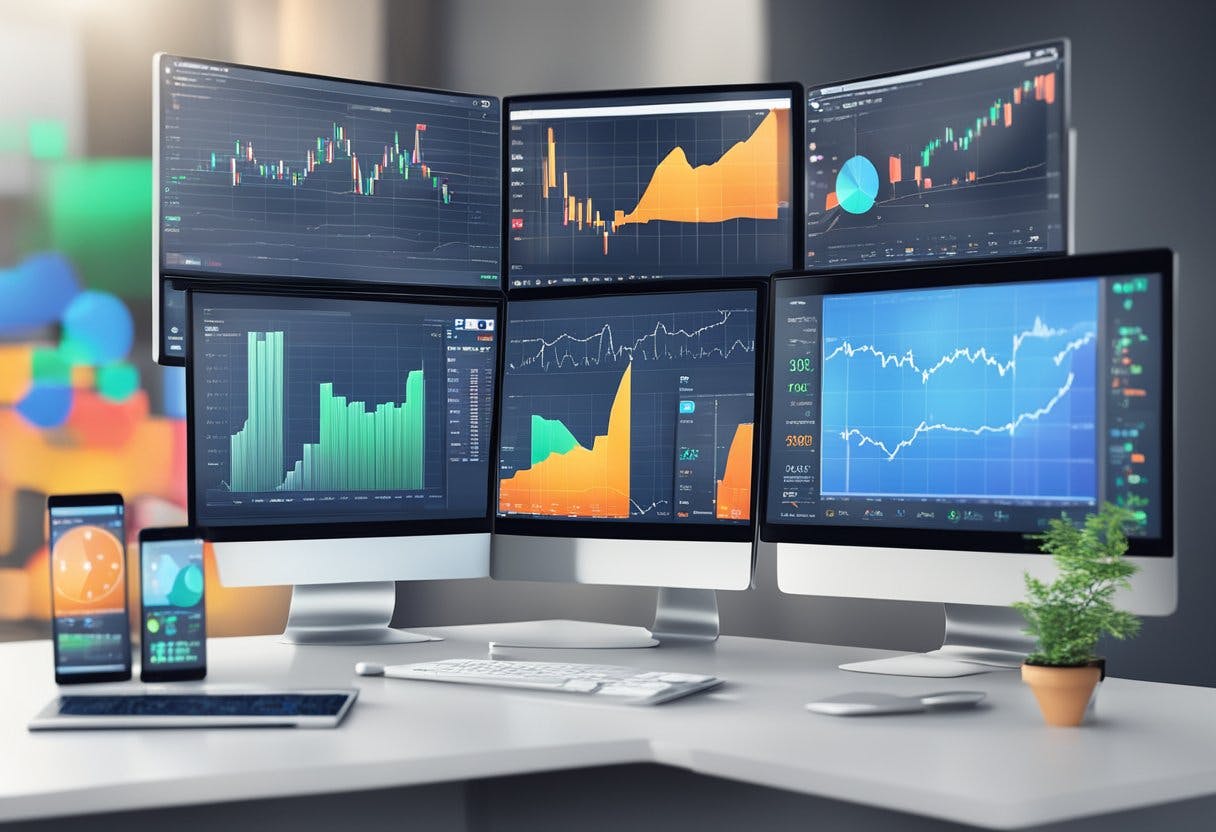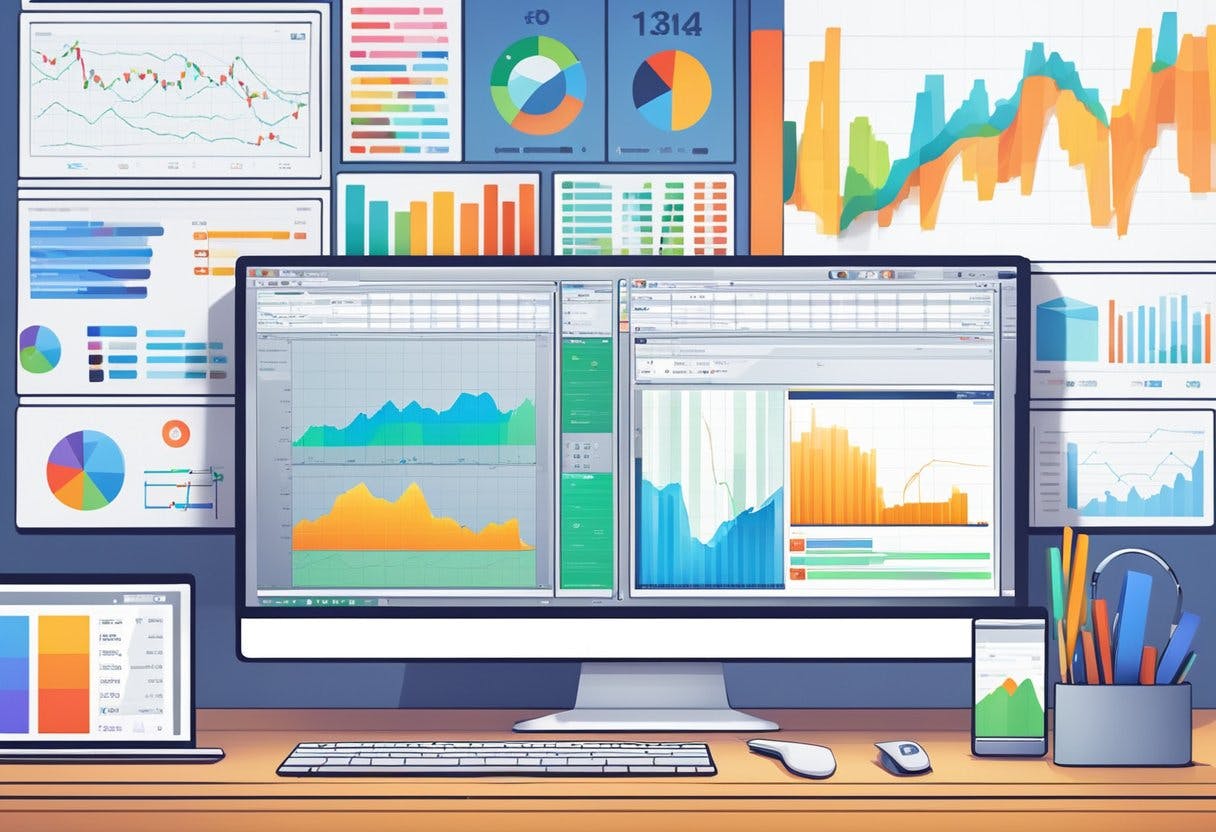
Social media has transformed the way people communicate and interact with each other. It has also revolutionized the world of forex trading, giving traders access to information, insights, and analysis that was once reserved for the professionals. Today, traders can use social media platforms like Twitter, Facebook, and Instagram to stay updated on current events, breaking news, and market updates that can impact currency prices.

Understanding Forex Trading and Social Media Forex trading involves the buying and selling of currencies with the goal of making a profit. Social media has become an important tool for traders to analyze market trends, develop trading strategies and stay up-to-date on the latest news and events. With millions of people using social media every day, traders can monitor and analyze the sentiment of the market in real-time, which can help them make more informed trading decisions.
Analyzing Market Trends Through Social Media Social media can provide traders with valuable insights into market trends and sentiment. By monitoring social media platforms, traders can track the conversations and opinions of other traders, as well as news and events that can impact the market. This information can be used to identify potential trading opportunities and to make more informed decisions about when to buy or sell currencies.
Key Takeaways
- Social media has become an integral part of forex trading, providing traders with access to real-time news and market updates.
- Traders can use social media to analyze market trends and sentiment, which can help them make more informed trading decisions.
- While social media can provide valuable insights, traders should also be aware of the risks and limitations of using social media in forex trading.
Understanding Forex Trading and Social Media

Forex trading is the buying and selling of currencies in order to make a profit. It is a highly competitive and complex market that is influenced by a variety of factors. One of the most recent and influential factors is social media. Social media has changed the way traders analyze and trade forex. In this section, we will discuss the impact of social media on forex markets and key social media platforms for forex traders.
The Impact of Social Media on Forex Markets
Social media has had a significant impact on forex markets. It has provided traders with access to real-time news and market updates. This information can be used to make informed trading decisions. Social media has also made it easier for traders to connect with each other and share trading strategies. This has led to the creation of online trading communities where traders can exchange ideas and insights.
Another way social media has impacted forex markets is through sentiment analysis. Social media sentiment analysis involves monitoring and interpreting the collective sentiment of market participants towards a particular currency or currency pair. This information can be used to predict market movements and make profitable trades.
Key Social Media Platforms for Forex Traders
There are several social media platforms that are popular among forex traders. These platforms provide traders with access to real-time news, market updates, and trading strategies. Some of the key social media platforms for forex traders include:
- Twitter: Twitter is a popular social media platform for forex traders. It provides traders with access to real-time news and market updates. Traders can also use Twitter to connect with other traders and share trading strategies.
- LinkedIn: LinkedIn is a professional social media platform that is popular among forex traders. Traders can use LinkedIn to connect with other traders and industry professionals. They can also use LinkedIn to showcase their trading skills and experience.
- Facebook: Facebook is a popular social media platform that is used by forex traders to connect with other traders and share trading strategies. It also provides traders with access to real-time news and market updates.
- YouTube: YouTube is a video sharing platform that is popular among forex traders. Traders can use YouTube to access educational videos, trading strategies, and market analysis.
- Instagram: Instagram is a photo and video sharing platform that is popular among forex traders. Traders can use Instagram to share trading strategies and market analysis.
- TikTok: TikTok is a video sharing platform that is popular among younger forex traders. Traders can use TikTok to share trading strategies and market analysis in a fun and engaging way.
Overall, social media has had a significant impact on the forex trading industry. It has provided traders with access to real-time news and market updates. It has also made it easier for traders to connect with each other and share trading strategies. Forex traders should take advantage of social media platforms to stay informed and make profitable trades.
Analyzing Market Trends Through Social Media

Social media has become a valuable tool for analyzing market trends in the Forex industry. By analyzing the opinions and emotions expressed by users on social media platforms, traders can gain valuable insights into market sentiment in real-time.
Sentiment Analysis and Market Sentiment
One of the key advantages of using social media for sentiment analysis is its vast and diverse user base. Social media platforms such as Twitter, Facebook, and LinkedIn have millions of active users who share their thoughts and opinions on a wide range of topics, including the Forex market. By analyzing these conversations, traders can get a sense of the overall sentiment towards a particular currency or market trend.
Sentiment analysis involves using natural language processing and machine learning algorithms to analyze social media data and determine the sentiment behind each post or tweet. This data can be used to create sentiment scores, which can help traders identify market trends and make more informed trading decisions.
Market sentiment refers to the overall attitude of traders towards a particular currency or market trend. By analyzing social media data, traders can get a sense of the prevailing sentiment towards a particular currency or market trend. This information can be used to make more informed trading decisions and stay ahead of the curve.
Real-Time Market Updates and Insights
Social media platforms also serve as a valuable tool for real-time market analysis. Traders can follow financial news outlets, market analysts, and Forex experts on platforms like Twitter and LinkedIn to receive instant updates on market trends, economic indicators, and geopolitical events that can impact currency prices.
By staying up-to-date on the latest news and market trends, traders can make more informed trading decisions and take advantage of market opportunities as they arise. Social media platforms offer a wealth of real-time information and insights that can help traders stay ahead of the curve and increase their chances of success in the highly volatile Forex market.
In conclusion, social media has revolutionized market analysis in the Forex industry, offering traders a wealth of real-time, user-generated data to gauge market sentiment, analyze trends, and stay up-to-date on the latest news and insights. By leveraging social media for market analysis, traders can make more informed trading decisions and increase their chances of success in the highly competitive Forex market.
Developing Forex Trading Strategies with Social Media

Social media has revolutionized the way traders approach forex trading strategies. It has opened up a world of opportunities for traders to learn, share ideas, and engage with experts and the community. In this section, we will explore how traders can leverage social media to develop effective forex trading strategies.
Leveraging Expert Opinions and Community Discussions
One of the most significant advantages of social media is access to expert opinions and community discussions. Traders can follow influential traders and analysts on social media platforms and gain insights into their trading strategies. By engaging with the community, traders can exchange ideas, ask questions, and learn from others’ experiences.
For example, Twitter is a popular platform for traders to share their thoughts on the market. Traders can follow hashtags related to forex trading and stay up-to-date with the latest news and market trends. By following experts and influencers on Twitter, traders can gain valuable insights into the market and develop effective trading strategies.
Educational Content and Learning Resources
Social media platforms offer a plethora of educational resources for traders. Traders can access webinars, podcasts, and online courses to enhance their knowledge and skills. Many forex brokers and trading educators maintain active social media profiles where they share educational content, trading strategies, and market insights.
For instance, YouTube is a popular platform for traders to access educational content. Traders can find tutorials, trading strategies, and market analysis videos on YouTube. By subscribing to trading educators’ channels, traders can stay informed about the latest trends and developments in the market.
In conclusion, social media has become an essential tool for traders to develop effective forex trading strategies. By leveraging expert opinions, community discussions, and educational content, traders can stay ahead of the curve and make informed trading decisions.
The Risks and Limitations of Social Media in Forex Trading
Social media has undoubtedly revolutionized the way people communicate and share information. However, it also presents risks and limitations when it comes to forex trading. Here are some of the risks and limitations that traders should be aware of:
Misinformation and Fraud on Social Platforms
One of the biggest risks associated with social media in forex trading is the spread of misinformation and fraud. Social media platforms are notorious for spreading fake news, rumors, and scams, which can have a significant impact on currency prices. Traders need to be cautious and verify the information before making decisions based on social media posts.
The Importance of Verifying Information
Verifying information is critical when it comes to forex trading. Traders should always double-check the sources of information they find on social media platforms and use reliable sources to make informed decisions. They should also exercise critical thinking and be wary of claims that sound too good to be true.
In addition, traders should be aware of the limitations of social media in forex trading. While social media platforms can provide valuable information and insights, they should not be relied upon as the sole source of information. Traders should use a variety of sources to make informed decisions and avoid making decisions based solely on social media posts.
Overall, social media can be a valuable tool for forex traders, but it also presents risks and limitations. Traders should exercise caution, verify information, and use critical thinking to make informed decisions. By doing so, they can minimize the risks associated with social media in forex trading and make better trading decisions.
Conclusion
Social media has become an integral part of forex trading, providing traders with access to real-time news, market analysis, and trading signals. However, traders must approach social media with caution, distinguishing between reliable sources and speculative opinions.
Experienced traders can leverage social media to gain valuable insights into market sentiment, while novice traders can use social media to learn from the forex community and improve their trading skills.
Making informed trading decisions is crucial for success in forex trading, and social media can provide traders with the necessary information to make these decisions. However, traders must be aware of the risks associated with social media, such as false information and market manipulation.
In summary, social media has revolutionized the way forex traders approach the market. It has democratized the market, providing traders with access to information that was previously only available to institutional investors. With the right approach, social media can be a powerful tool for traders to improve their trading performance and achieve success in forex trading.
Frequently Asked Questions
How does social media influence forex trading strategies?
Social media has a significant impact on forex trading strategies. Traders can use social media platforms to gather real-time market information, which can help them make informed decisions. They can also use social media to connect with other traders, share ideas, and learn from each other. Social media can also influence market sentiment, which can impact currency prices.
What are the benefits of using social media for forex trading?
Using social media for forex trading has several benefits. Traders can get access to breaking news and market updates, which can help them make informed decisions. They can also connect with other traders, share ideas, and learn from others’ experiences. Social media can also help traders stay up-to-date with the latest market trends and analysis.
How have online trading communities affected forex market trends?
Online trading communities have had a significant impact on forex market trends. They have made it easier for traders to connect with each other and share information. This has led to the emergence of new trading strategies and techniques, which have influenced market trends. Online trading communities have also made it easier for traders to access information and analysis, which has helped them make better trading decisions.
What precautions should forex traders take when using social media platforms?
Forex traders should take several precautions when using social media platforms. They should be careful about who they connect with and what information they share. They should also be cautious about the sources of information they rely on and verify information before acting on it. Traders should also be aware of the risks of social engineering attacks and phishing scams.
Why is Instagram popular among forex traders for market analysis?
Instagram is popular among forex traders for market analysis because it is a visual platform that allows traders to share charts and graphs. Traders can use Instagram to share their trading strategies and analysis, which can help them build a following and gain credibility. Instagram also allows traders to connect with other traders and share information in real-time.
How does social trading differ from traditional forex trading?
Social trading differs from traditional forex trading in that it allows traders to copy the trades of other traders. Social trading platforms allow traders to follow and copy the trades of successful traders, which can help them make profitable trades. Social trading also allows traders to connect with other traders and share ideas and analysis. However, social trading also has risks, and traders should carefully evaluate the traders they choose to follow.
Read More




